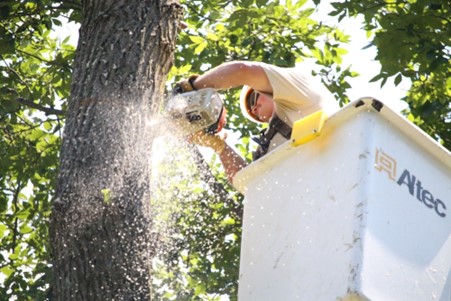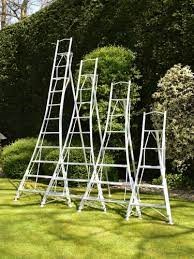Tree surgery is a highly skilled and sometimes dangerous job. In order to carry out the necessary work and procedures, specialist equipment is vital. Modern equipment is highly powered and accidents can occur in seconds.
Tree Surgery Equipment

The correct piece of equipment, one that has been carefully maintained and is operated by a fully trained and accredited tree surgeon, is a vital resource in keeping both the surrounding property and the tree surgery team safe. Naturally, homeowners or passers-by will be asked to maintain a safe distance from the area and barriers can be employed to achieve this.
Use of the correct equipment is also more efficient; a chainsaw can fell a tree in minutes whereas a manual saw would take hours of exhausting work, and a cherry picker can raise the operative to any height to deal with a tree that would be unsafe to climb.
Tree surgeons use both powered and manual tools and each has its part to play. I and my staff at Take a Bough Tree Care are very aware of the environmental issues that surround us and are investing heavily in battery-powered equipment in place of petrol engines wherever possible, as well as new trucks which are emissions compliant with the latest regulations and recommendations.
The most basic part of a tree surgeon’s equipment is the truck, needed to convey men and equipment to and from the site, tow chippers and take away the branches, trunks and brush.
Tree Surgery Tools Guide pt 1 – Power Tools
- Chain Saws – The defining image of a tree surgeon is one where he wields a chain saw! These are available in various sizes and require training with accreditation and experience to use safely.
- Chippers – A chipper is a large powerful piece of equipment which reduces branches and small logs to wood chips that can be used as paths, or garden mulch or taken to a specialist centre for further processing.
- Stump Grinders – Stump Grinders have powerful rotating teeth to reduce the part of the tree trunk that is left after felling to sawdust, thus removing the stump and also removing that part of the tree and main roots that grow underground. Grinding out a stump avoids trip hazards in a garden setting and also prevents regrowth and decay affecting other plants nearby. Stump grinders come in various sizes from small ones the size of a ride on mower to those as large as a tractor.
- Cherry Pickers – Cherry pickers are used when it would be too dangerous to physically climb a tree, for example, if it was dead or if the ground underneath the tree was not suitable for ladders or if access was difficult.
- Radios – Communication is vital in tree surgery, especially between the climber and the ground crew and radios are a valuable resource. They need to be weatherproof, durable and easy to operate.
Tree Surgery Tools Guide pt 2 – Manual Tools
- Axes and Splitting Mauls – These are among the earliest tools used to fell trees, nowadays replaced by chain saws, they are still useful for splitting logs for firewood or removing brush from the bottom of tree trunks.
- Hand Saws – Several kinds of handsaws are in everyday use for tree surgery. Pole saws are used to cut small branches and in cutting back hedges and foliage where a chain saw is not necessary. They can be plain or telescopic. Handheld pruning saws are useful and are often curved to make accessing the branch easier. Bow saws and crosscut saws can also be useful for small jobs.
- Timber Trolley – Heavy-duty timber trollies are used to remove large or heavy logs from the site to the truck.

- Ladders – Tree surgeons use several kinds of ladder in their work, ladders of different heights and both traditional ladders and tripod ladders where a stable base is necessary.
- Climbing and Load Bearing Equipment – Tree surgeons use a variety of both climbing aids and load-bearing equipment. Climbing spikes, ropes, rigging equipment, harnesses and friction devices are part of a tree surgeon’s safety equipment for climbing, as rotten branches or heavy detached branches being lowered to the ground can cause serious and sometimes fatal injuries.
- Blocks and Pulleys – These are similar but are used for different things. Blocks are designed to withstand heavy loads and have a locking mechanism and are designed to have a sling attached if needed. Cable hoists are used to lift heavier loads and friction brakes are used to help the climber control the wood as it is lowered to the ground. Pulleys are used to manoeuvre lighter weights than blocks and are often used to remove small leafy branches.
- Personal Equipment – Important personal safety equipment includes a helmet with ear defenders and visor, suitable outer clothing that will not snag or catch and specialist chainsaw trousers lined with Kevlar or ballistic fibres (known as “Aramid” fibres). When the chainsaw meets the outer layer, these fibres are drawn out of the trousers and into the engine of the chainsaw, causing a jam. The chainsaw will then stop and prevent any more damage from being done to the wearer. Leather gloves and steel-toed boots are further vital pieces of personal equipment.
- Tidying Up –Take a Bough Tree Care prides itself on leaving a site spotlessly clean and tidy and to that end has a range of leaf blowers, brooms, and rakes. No debris is ever left behind and every trace of sawdust is removed.
If you are in South West London and looking for someone to remove or otherwise service your tree, give us a call by clicking above, or complete our contact form so we can get back to you about providing a free quotation – we will be very happy to hear from you!

